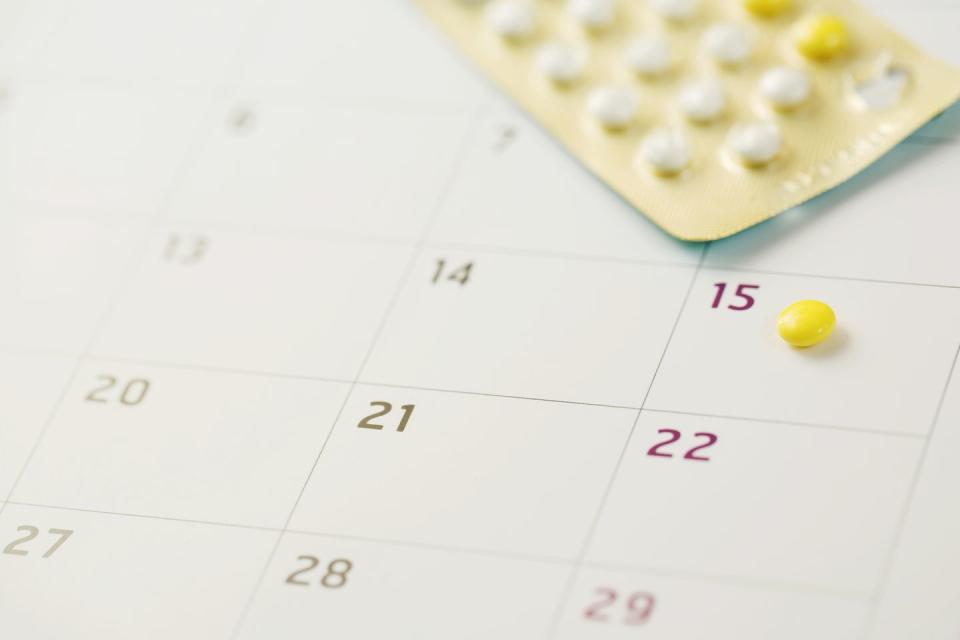Doctors Share 6 Reasons for a Late or Missed Period

It’s a real bummer when Aunt Flo arrives unexpectedly, but it can be even more panic-inducing when she doesn’t show up at all. Every woman has a late or missed period at some point and the first step to figuring out why is getting familiar with your period before it’s missed. “In order to determine your normal menstrual cycle it is important to keep track of when you have your period through a calendar or app on your phone,” says Shannon Schellhammer, M.D., F.A.C.O.G., an obstetrician/gynecologist at Orlando Health.
Essentially, every woman’s body is different and works at its own speed. In fact, despite the popular belief that there are 28 days in a menstrual cycle, a 2019 study of more than 600,000 women in the journal Nature found that only 13% of women have 28-day cycles, and 29.3 days is actually the average length. On top of that, the International Federation of Gynecology and Obstetrics reports that a normal cycle can range anywhere from 24 to 38 days.
“Your period is late if you are more than five days past the expected start date of your period,” says Jacqueline M. Walters, M.D., an obstetrician/gynecologist and author of the forthcoming book The Queen V: Everything You Need to Know About Sex, Intimacy, and Down There Health Care. “Your period is considered missed if you have gone more than one to two weeks past the expected start date.” Our bodies are so complex that the potential reasons why you might miss a period are endless, but here are a few common ones.
1. Pregnancy
“The number one cause for a missed period is pregnancy!” says Dr. Schellhammer. She advises taking a home pregnancy test if you are sexually active, regardless of your age and form of birth control. Once you rule out pregnancy, it is safe to wait for the next month to see if you have a normal period. “However, if you are concerned or do not have a clear cause of why you missed your period, I recommend you call your OB/GYN or primary care doctor to be seen. This is especially important if you have not been seen within the last year for an annual well-woman exam.”
2. Stress
Stress — whether it’s from something great like planning a wedding, starting a job, or moving to a new house, or something not-so-great like job loss, a bad relationship, or depression — can press “pause” on your period. “The chemistry required to develop and produce a ‘normal’ cycle can be influenced and delayed by high levels of cortisol and/or adrenaline, which increase in the body as a result of chronic, daily stress,” says Hector O. Chapa, M.D., F.A.C.O.G., clinical assistant professor of obstetrics and gynecology at Texas A&M University College of Medicine. “This delayed cycle may be your body’s way of reminding you to take care of yourself.” If stress is the cause for your missed period, it should resume when things in your life calm down.
3. Polycystic Ovarian Syndrome (PCOS)
"Without a doubt, PCOS is the most common ‘hormone imbalance in women that leads to delayed or missed cycles in women aged 18 to 44, excluding pregnancy,” says Dr. Chapa. The condition occurs when a woman produces more male hormones than normal. “While blood tests and a vaginal ultrasound may support a diagnosis, the diagnosis may be considered if a woman has two of these three symptoms: excess facial or male-pattern hair growth, irregular periods and ovaries that appear to have little cysts.” There’s no cure, but your OB/GYN can help you find the right treatment to get your cycle back on track. If PCOS isn’t the culprit, your physician can help you figure out if another hormonal imbalance caused by thyroid or pituitary problems is at play.
4. Excess exercise
Exercise is necessary for our well-being, but too much of it—without the caloric support—can take a toll on our bodies and trigger missed periods. “The ‘female athlete triad’ occurs when a female athlete has low energy intake or disordered eating, menstrual delays or absence and low bone mass,” says Dr. Chapa. Along the same lines, a bodyweight that’s more than 10% below the ideal weight for your height can mess with your menstrual cycle.

5. Medications
When you put a chemical into your body (including herbal supplements), it can cause a chain reaction that spreads across different systems. “Birth control, antipsychotics, antidepressants, and chemotherapy can all cause a missed period,” says Dr. Walters. If you recently started a new medication and started skipping periods, bring it up with your physician to see if it’s a normal side effect. For instance, with some contraceptives — including IUDs, the shot, and certain birth control pills — your period may stop altogether.
6. Perimenopause
“Unless the ovaries are surgically removed, menopause doesn’t just happen,” says Dr. Chapa. “The interval leading up to menopause is called the perimenopause and is marked by hot flashes, mood changes, and of course, changes in the menstrual cycle — called ‘skips and delays.’” While the average age of menopause in the U.S. is 51, Dr. Chapa says these changes can start anytime in your 40s.
The bottom line: “A missed period rarely causes immediate harm to a woman’s health, but it does signify something underlying,” says Dr. Walters. “If the pattern continues, it can affect a woman’s ability to get pregnant, cause bone loss, lead to ovarian cysts, and cause excessive male-pattern hair growth — thinning or balding on the head and more hair on the face, chest and abdomen.” No one knows your body better than you so the best thing you can do is pay attention and don’t hesitate to give your OB/GYN a call if something feels off.
You Might Also Like
